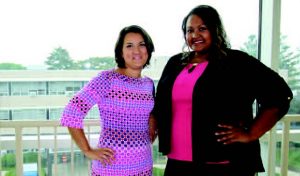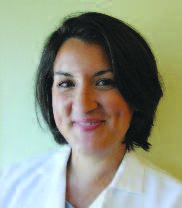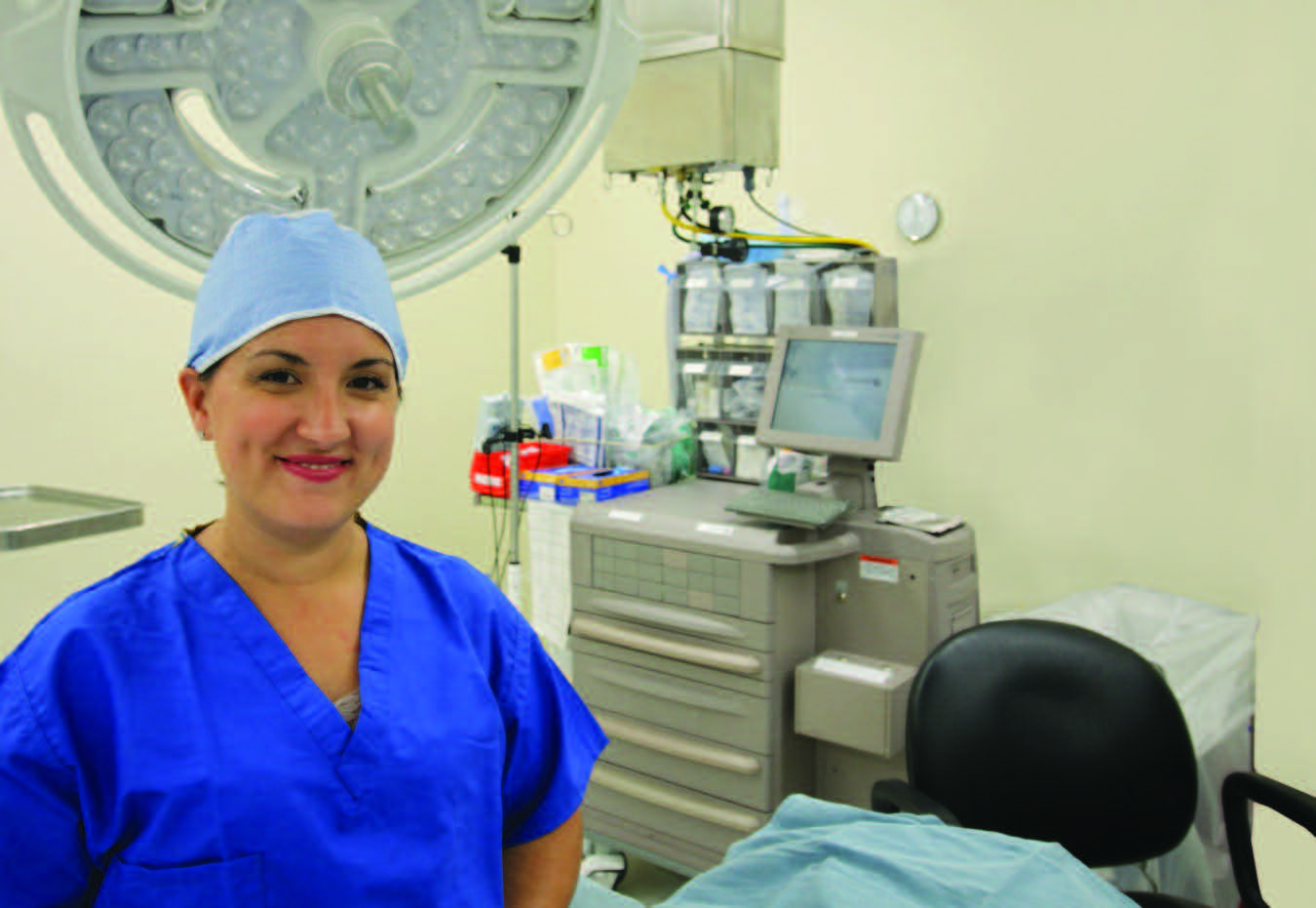Dr. Adriana Suarez walks the walk…and talks the talk.
By Yolanda Navarra Fleming
When a doctor and a patient literally don’t speak the same language, building a relationship based on trust and under-standing poses a challenge that, at times, can be impossible to overcome. As a native Spanish speaker, Dr. Adriana I. Suarez-Ligon offers patients of Trinitas Regional Medical Center the most current and accurate breast health care in two languages.
“There is a large language barrier that exists between the Latino community and the healthcare system,” says Dr. Suarez, who recently joined the Surgical Department at Trinitas as a breast surgeon—and is also an Instructor of Surgery at Rutgers University–New Jersey Medical School in the Division of Surgical Oncology. “Enough is lost in translation when doctors do speak the same language as their patients. I am excited to bridge the gap between the Dr. Adriana Suarez-Ligon (left) pictured with Veronica Vasquez (right), MHA, CN-BA, Breast Patient Navigator, within the Trinitas Comprehensive Cancer Center. local Hispanic community and the healthcare system.”
Born in the Bronx to Cuban parents, Dr. Suarez received her Doctor of Medicine from the University of Medicine & Dentistry of New Jersey–New Jersey Medical School in 2009, and completed her general surgery residency at Rutgers in 2015.

Dr. Adriana Suarez-Ligon (left) pictured with Veronica Vasquez (right), MHA, CN-BA, Breast Patient Navigator, within the Trinitas Comprehensive Cancer Center.
“Medicine and surgery are complicated,” she says. “Breast cancer is complicated. Even speaking the same language, medical terminology is a language on its own. Just think, we doctors go to medical school for four years before we even complete a specialty training program, which is oftenup to a decade of training before we go out into practice our given specialty. We have all that time to understand the disease processes that we treat and the treatments we offer. Patients generally don’t have that background and now we have to explain their disease to them in an office visit that may not last more than one hour. At least doing so in their native language is a start.”
Dr. Suarez, who doesn’t remember a time that she didn’t want to be a doctor, has followed in the footsteps of her father and aunt, both OBGYNs. However, medical school intrigued her with the prospect of not only being able to care for patients, but also to remove their disease.
“I really loved the idea of being able to care for female patients with the perspective of being female myself,” she says. “As a breast surgeon, I am able to take care of the female patient with a surgeon’s hands.”
With every new patient a partnership is formed, Dr. Suarez explains. The human being is her top priority, not just the case. She interacts with mothers and fathers, daughters and sons, wives and husbands and oftentimes, she says, she sees herself in a patient.
“Each patient is different and at different stages in their lives,” Dr. Suarez explains. “They’ve had vastly different life experiences that make them the unique people they are. These unique experiences also shape how they respond to their diagnosis, whether benign or malignant, and how they approach the treatment plan. I very strongly believe in giving patients all the information they need to make informed decisions for themselves. That said, not all patients want all the information [these patients are rare, she maintains] and want me to make the decision for them; I am okay with this, too.”
And just as no two patients are alike, no two breast cancers are created equal. Indeed, Dr. Suarez takes a special interest in breast cancer disparities, especially among Hispanic women, young breast cancer patients, and high-risk patients.
“Each breast cancer is as unique as the patient that has the disease,” she explains. “It is very important for doctors to approach each patient with breast cancer on a very individual basis. Similarly, patients need to acknowledge that the stories that they hear and the information that they read may not apply to them. With the accessibility of the internet, there is a lot of information floating around that is not all validated. Be careful and ask a lot of questions.”
As comfortable as Dr. Suarez is interacting with patients and their families, it is in the operating room where it all comes together. The OR, she says, is a place of Zen and extreme concentration.
“Operating on my patients is a privilege,” she explains. “One I am very grateful to have. In the OR, my patients relinquish control over their body and trust me to provide them with the highest level of care. I leave everything behind when I enter the OR with a patient and focus solely on them.”
“I truly believe that my patients and I are partners in their healthcare process. I am the one trained to provide them with their surgical care, but together we make the decisions”

Adriana I. Suarez-Ligon, MD Breast Surgery
Trinitas Regional Medical Center (908) 994-8230
Editor’s Note: Dr. Adriana I. Suarez-Ligon is a frequent lecturer on a wide variety of topics related to breast cancer. She is trained in the spectrum of benign and malignant breast diseases, and is an expert in the vast spectrum of breast pathology. For benign disease, she performs excisional breast biopsies. For malignant disease, she offers breast conservation surgery, oncoplastics, skin and nipple sparing mastectomies, as well as axillary staging procedures. Earlier in 2016, Dr. Suarez completed a Society for Surgical Oncology Accredited Breast Surgical Oncology Fellowship at Emory University School of Medicine in Atlanta. She and her husband, a coach for Nike, have two children.





